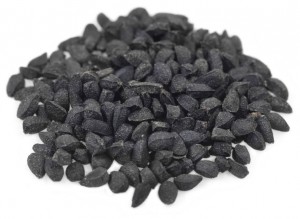By Sayer Ji
Contributing writer for Wake Up World
A study published in the Journal of Ethnopharmacology reveals that the seeds of Nigella sativa, commonly known as “black seed,” may provide an ideal nutritional supplement for preventing or slowing the progression of Alzheimer disease.[1]
Researchers divided forty elderly volunteers into a treatment group receiving 500 mg capsules of Nigella Sativia twice daily for nine weeks and a placebo group. Subjects were assessed for neuropsychological state and safety profile twice before treatment and after nine weeks. The trial resulted in significant improvements in memory, attention and cognition without any measurable changes in any biochemical markers of cardiac, liver, or kidney function during the nine-week study period.
The researchers also noted that beyond its neuroprotective properties Nigella Sativa also has kidney protective, lung protective, cardioprotective and liver protective properties.
It is remarkable that a thousand years ago the Persian scholar Ibn S?n? described Nigella sativa in his Canon of Medicine for their enlivening and tonifying effects as follows: ‘It stimulates the body’s energy and helps recovery from fatigue and dispiritedness. It appears that science is only now catching up to the wisdom of the ancients, which in the case of Black Seed, was known as ‘The Remedy for Everything But Death.’
Our own review of the scientific literature on the US National Library of Medicine reveals this remarkable seed’s experimentally confirmed benefits articulated through 20 distinct physiological actions:
- Analgesic (Pain-Killing)
- Anti-Bacterial
- Anti-Inflammatory
- Anti-Ulcer
- Anti-Cholinergic
- Anti-Fungal
- Ant-Hypertensive
- Antioxidant
- Antispasmodic
- Antiviral
- Bronchodilator
- Gluconeogenesis Inhibitor (Anti-Diabetic)
- Hepatoprotective (Liver Protecting)
- Hypotensive
- Insulin Sensitizing
- Interferon Inducer
- Leukotriene Antagonist
- Renoprotective (Kidney Protecting)
- Tumor Necrosis Factor Alpha Inhibitor
Black seed, like turmeric, ginger, pepper, oregano, and cinnamon, is commonly used as both a food and medicine in traditional cultures. As research continues to accumulate confirming ancient dietary compounds in preventing and treating disease, a genuine paradigm shift within conventional medicine is imminent. When safe, affordable and easily accessible spices, herbs and food concentrates produce therapeutic effects often superior to the drugs, we are increasingly encouraged to look to the farm before the pharmacy.
Article References:
- [1] Muhammad Shahdaat Bin Sayeed, Md Asaduzzaman, Helal Morshed, Md Monir Hossain, Mohammad Fahim Kadir, Md Rezowanur Rahman. The effect of Nigella sativa Linn. seed on memory, attention and cognition in healthy human volunteers. J Ethnopharmacol. 2013 Jul 30 ;148(3):780-6. Epub 2013 May 21. PMID: 23707331
About the author:
Sayer Ji is the founder of GreenMedInfo.com, the world’s leading open access, evidence-based resource supporting natural and integrative health modalities. He is Vice Chairman of the Board for the National Health Federation and Fearless Parent, a Steering Committee Member of the Global GMO-Free Coalition (GGFC), and a reviewer at the International Journal of Human Nutrition and Functional Medicine.
For more, visit GreenMedInfo.com and Facebook.com/GreenMedInfo, or sign up for GreenMedInfo’s free e-Newsletter.
Recommended articles by Sayer Ji:
- Acupuncture Beats Injected Morphine for Pain: Groundbreaking Study
- Group Drumming Better Than Prozac, Study Suggests
- Mammography Is Harmful and Should Be Abandoned, Scientific Review Concludes
- “Killer Germs” Obliterated by Medicinal Smoke Smudging, Study Reveals
- 6 Evidence-Based Ways Drumming Heals Body, Mind and Soul
- Coconut Water: A New Alzheimer’s Disease Treatment?
- Turmeric’s ‘Smart Kill’ Properties Put Chemo & Radiation To Shame
- Tylenol Kills Emotions As Well As Pain, Study Reveals
- Beet Juice Boosts Cognitive Function In One Dose
- 13 Evidence-Based Medicinal Properties of Coconut Oil
- 25 Cancer Stem-Cell Killing Foods That Are Smarter Than Chemo and Radiation
- Roundup Weed Killer (Glyphosate) Threatens Coral Reefs, Persists In Seawater

If you've ever found value in our articles, we'd greatly appreciate your support by purchasing Mindful Meditation Techniques for Kids - A Practical Guide for Adults to Empower Kids with the Gift of Inner Peace and Resilience for Life.
In the spirit of mindfulness, we encourage you to choose the paperback version. Delve into its pages away from screen glare and notifications, allowing yourself to fully immerse in the transformative practices within. The physical book enriches the learning process and serves as a tangible commitment to mindfulness, easily shared among family and friends.
Over the past few years, Wake Up World has faced significant online censorship, impacting our financial ability to stay online. Instead of soliciting donations, we're exploring win-win solutions with our readers to remain financially viable. Moving into book publishing, we hope to secure ongoing funds to continue our mission. With over 8,500 articles published in the past 13 years, we are committed to keeping our content free and accessible to everyone, without resorting to a paywall.








